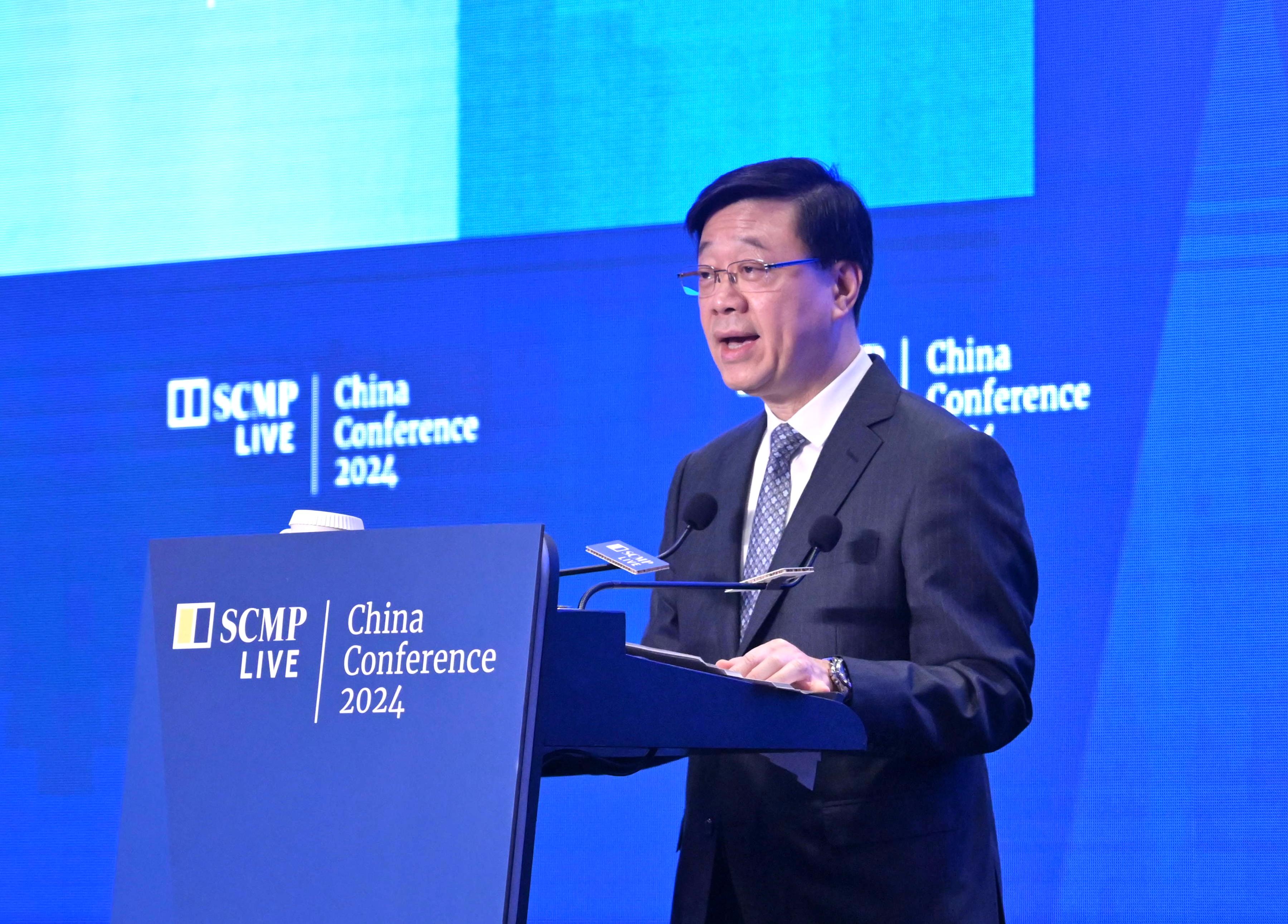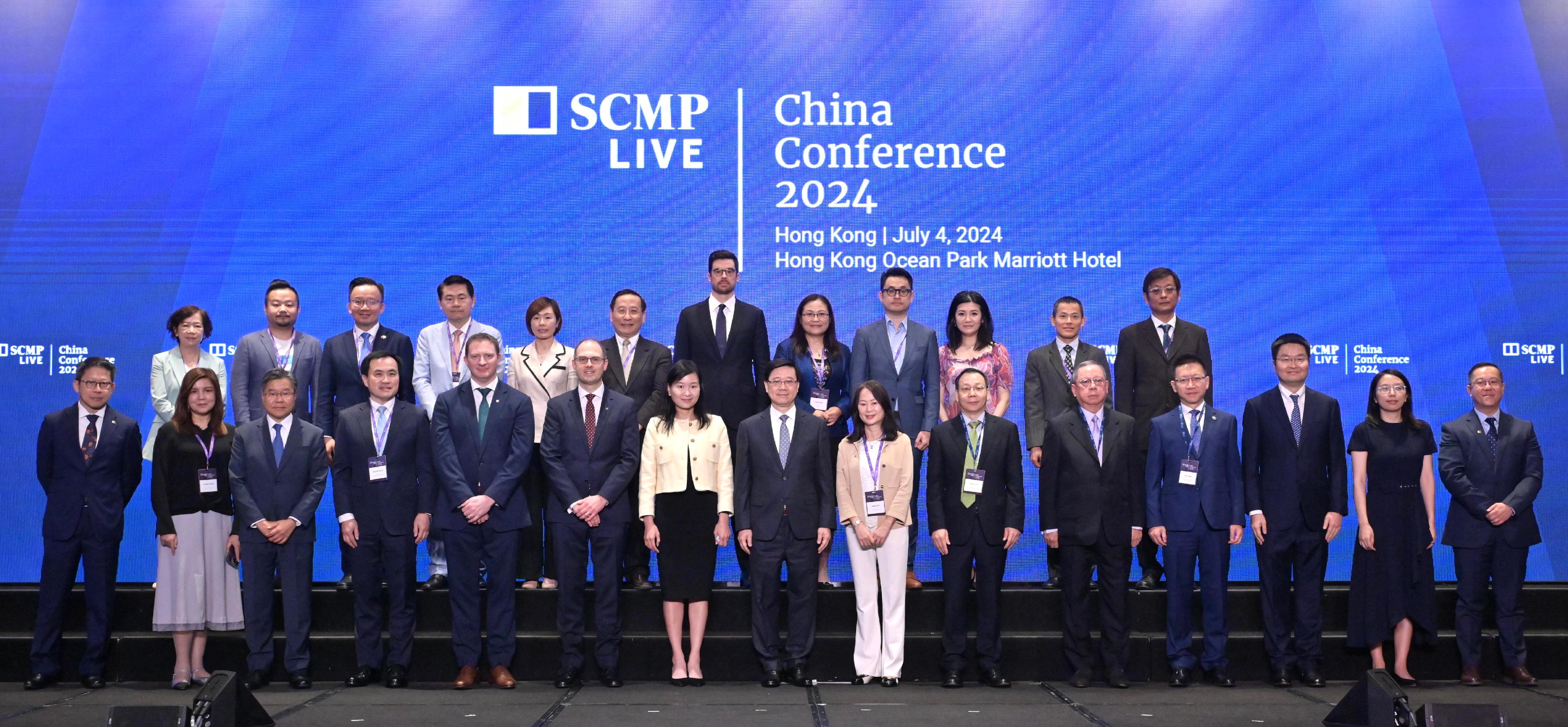Speech by CE at South China Morning Post China Conference 2024 (English only) (with photos/video)
Following is the speech by the Chief Executive, Mr John Lee, at the South China Morning Post China Conference 2024 today (July 4):
Ms Catherine So (Chief Executive Officer of the South China Morning Post), Ms Tammy Tam (Editor-in-Chief of the South China Morning Post), Mr Phil Witherington (President and Chief Executive Officer of Manulife Asia), distinguished guests, ladies and gentlemen,
Good morning. I would like to, first of all, thank Phil for bringing up this new card-type travel document, to have great convenience to visit the Mainland. I would like to highlight that it is actually a big policy breakthrough. It may be a step in your convenience, but it is a big step in making that breakthrough. It is, in fact, the second step because the first step I have done to create convenience for non-Chinese friends in Hong Kong is that for any staff of companies setting up in Hong Kong, there has been a fast-track procedure for them to apply for a visa to visit the Mainland. One application is valid for two to three years and is multi-entry. So that is step one and now we have step two, and there will be more steps coming. I hope that I will deliver more to you in due course.
I'm delighted to be here, once again, for this annual conference of the South China Morning Post. This is a much welcomed occasion to update you all, on Hong Kong's distinct advantages as a global city and our deepening economic integration with the Mainland, as well as the wide-ranging promise for the city and for the companies and start-ups, the entrepreneurs, innovators and young people looking to Hong Kong for long-term opportunities, and the flourishing future we can create. Working together.
Just three days ago, we celebrated the 27th anniversary of the establishment of the Hong Kong Special Administrative Region.
In doing so, we also celebrated the achievements of the unique "one country, two systems" principle, and the accomplishments of our economy and our community.
Last month, the World Competitiveness Yearbook, published by the International Institute for Management Development, named Hong Kong the world’s fifth-most competitive economy, rising by two positions in a year.
Last year, the same Institute ranked our talent competitiveness second in Asia. Also last year, the annual report on Economic Freedom of the World ranked Hong Kong second, globally.
It's not surprising then, that more than 320 Mainland and overseas companies set up or expanded their businesses in Hong Kong through the first six months of this year, thanks to Invest Hong Kong, our designated investment promotion agency. That, ladies and gentlemen, represents a year-on-year rise of 43 per cent. These companies come from 33 economies from across the globe. Together, their investment to Hong Kong, so far, is close to US$5 billion, and they have created more than 3 500 job opportunities here.
And they are far from alone. Hong Kong is home to over 9 000 Mainland and overseas companies, including about 50 strategic enterprises here through OASES – the Office for Attracting Strategic Enterprises, set up by this Government a year and a half ago. These strategic enterprises are pioneers in different innovation and technology fields, and they are investing more than US$5 billion in Hong Kong and creating over 13 000 jobs. Most of those jobs, let me add, will be in scientific research and management positions.
Thanks to the unique "one country, two systems", Hong Kong has the unique advantages of enjoying the bountiful support from our country, China, while maintaining unparalleled connectivity with the world. Our robust legal system, together with other long-standing institutional strengths such as the free flow of information, capital, goods and people, a low and simple tax regime, with both Chinese and English as official languages, ensure our strategic role as a "super connector" and "super value-adder" between the Mainland and the rest of the world.
Hong Kong champions multilateralism and accords high priority to establishing partnerships with different economies. Our connections with ASEAN (Association of Southeast Asian Nations) have grown since the ASEAN-Hong Kong, China Free Trade Agreement came into force in June 2019. Last summer, I led a high-profile business delegation to a number of ASEAN countries to pave the way for broader co-operation.
Aside from ASEAN, we will continue to strengthen regional collaboration, say with the Middle East, and enhance our links with Europe and other Western markets, thereby serving well as an important node of the national and international dual circulation, creating new opportunities and fresh impetus.
Looking ahead, we will seize both national and international opportunities, and board the "fast train" of our country's development. Thanks to our country's unwavering support, I'm confident that the opportunities will only continue to expand.
On Monday, the Mainland announced that non-Chinese Hong Kong permanent residents would be eligible for a special Mainland travel permit, which Phil has mentioned, allowing them to enjoy self-service clearance at Mainland control points.
Issuance of the new travel permits begins next Wednesday. This groundbreaking measure underlines Hong Kong's singular status under "one country, two systems". And I have no doubt that they will attract companies and talent from around the world to Hong Kong, a perfect springboard for their pursuit of the abundant opportunities of China.
On Monday, as well, I welcomed the prospect of continuing liberalisation of trade in services under CEPA – the Mainland and Hong Kong Closer Economic Partnership Arrangement.
We have largely reached a consensus on new measures to further open up the Mainland's trade in services with Hong Kong. They will go a long way in deepening business co-operation between Hong Kong and the Mainland. For 21 years now, CEPA has enabled Hong Kong companies, including companies set up in Hong Kong by overseas enterprises and professionals, to enjoy preferential treatment in developing their businesses in the Mainland.
That highlights Hong Kong's great advantage – our dual gateway role between the Mainland market and the global market. And with the continuing development of the Guangdong-Hong Kong-Macao Greater Bay Area, our gateway role will only grow.
With a population of some 87 million, and an economic output exceeding RMB14 billion last year, the Greater Bay Area is among the most economically vibrant regions of our country. With less than 1 per cent of the country's land area, the Greater Bay Area generates one-ninth of China's GDP.
The Hong Kong SAR Government attaches great importance to the Greater Bay Area and its role in our future. More than a key national strategy, it is the obvious entry point for Hong Kong to integrate into the country's national development.
Take financial services as an example. In February, the Cross-boundary Wealth Management Connect Scheme was enhanced.
It now offers an increased personal investment limit and enlarged product coverage. It also enables securities companies to participate in the Scheme. At the end of April 2024, more than 110 000 individual Greater Bay Area investors had participated in the Scheme, with cross-boundary fund remittances surpassing RMB50.7 billion.
In the last year or so, we have also seen the introduction of Northbound Trading of Swap Connect, and the Hong Kong Dollar-Renminbi Dual Counter Model, both of which are innovative measures to connect the world-class financial markets of Hong Kong and the Mainland.
The Hong Kong Dollar-Renminbi Dual Counter Model, which I had just mentioned, allows investors to buy stock through either Hong Kong dollars or Renminbi, and sell them in the same way. In other words, you can actually convert your currencies through trading the stocks under this Dual Counter Model. That means it gives you the investment return, as well as saving the currency exchange expenses.
The Shenzhen Municipal Government has issued offshore, Renminbi-denominated bonds in Hong Kong three years in a row. In doing so, they have reinforced Hong Kong's position as an international financial centre and the world's largest offshore Renminbi business hub.
Innovation and technology (I&T) is another policy priority of the Hong Kong SAR Government. It too, fits smartly with the Greater Bay Area's development plans.
Last year's Global Innovation Index named the Shenzhen-Hong Kong-Guangzhou science and technology cluster second among the world's top 100 clusters, for the fourth consecutive year.
We are also working with the Shenzhen Government on the Shenzhen-Hong Kong Innovation and Technology Co-operation Zone in the Lok Ma Chau Loop. This massive I&T development transcends the boundary between Hong Kong and Shenzhen, and takes in both the Hong Kong-Shenzhen Innovation and Technology Park in Hong Kong, and the Shenzhen Park.
In April, some 60 leading innovation and technology companies from nine economies signed MOUs (Memorandums of Understanding) to set up their business in the Hong Kong Park.
These companies will bring to the Park strategic specialisations, ranging from life and health technology to new energy, microelectronics and much more.
Hong Kong offers the Greater Bay Area internationally recognised professional services.
Hong Kong legal practitioners can now obtain qualifications to practise, in specific civil and commercial matters, in the Greater Bay Area. With dual qualifications, and well versed with both the common law and Chinese law, our legal practitioners have an edge in providing one-stop services for cross-boundary transactions.
In addition, Hong Kong and other foreign-invested enterprises registered in Shenzhen's Qianhai area now have the option to adopt Hong Kong law as the applicable law. And those in the Mainland's Free Trade Zones can choose Hong Kong as the seat of arbitration in their civil and commercial contracts.
Similarly, companies and professionals in five disciplines – engineering, architecture, surveying, planning and landscape architecture – can provide direct services in the Greater Bay Area's nine Mainland cities through a simple registration system.
That, ladies and gentlemen, is just part of the good opportunities awaiting Hong Kong, and those of you who endeavour to thrive with this energetic city.
Looking at the year ahead, Hong Kong will focus our efforts in three main areas, developing the economy and improving people's livelihood, reinforcing Hong Kong's competitive edge and exploring new areas of growth, and seizing both national and international opportunities. We will unite and lead society in seeking innovation all the way.
My thanks, once again, to the South China Morning Post, for organising this annual global gathering. I wish you all a rewarding conference. And the summer of your life, right here in Hong Kong. Do enjoy every minute of it.
Thank you very much.

